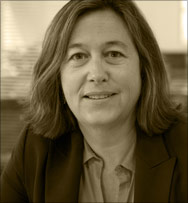 As MobiHealthNews reported last week, the University of Southern California Center for Body Computing wants to become the "epicenter of wireless health."
As MobiHealthNews reported last week, the University of Southern California Center for Body Computing wants to become the "epicenter of wireless health."
That's a lofty goal, considering the other, similar organizations right there in Southern California, including the UCLA Wireless Health Institute right there in Los Angeles, and, down toward San Diego, the West Wireless Health Institute, the Scripps Translational Science Institute and the Wireless-Life Sciences Alliance. But it's a challenge that Center for Body Computing Executive Director Dr. Leslie Saxon is up for, in a cooperative rather than confrontational way.
"It really does feel like the Southern California corridor is the leader in the wireless health space," Saxon says in an interview with MobiHealthNews. Saxon happens to be on the medical advisory board of West Wireless, and is eager to collaborate with that budding institution. West, she notes, has a lot of expertise with government and regulatory issues.
What USC, as a private university, brings to the table, is the ability to work in a multidisciplinary manner, across departments and in partnership with businesses and other institutions, according to Saxon. (Seventeen companies are among the founding members of the Center for Body Computing.) Saxon, the chief of cardiovascular medicine at USC Keck School of Medicine, spent 12 years in the state-run University of California system, where much of the technology developed had to stay in the public domain.
At USC, Saxon says, it is much easier to privatize technology transfer and commercialize good ideas, and the institution can provide a level of trust to the marketplace. "USC is willing to manage potential conflicts," Saxon says.
But she is most optimistic about the chance to work across disciplines. "We have a very strong relationship with the business school," Saxon says. The medical school has a staff of 500 physicians, who can test technologies in clinical settings, and Saxon reports that some people from the music school have come to her with musical apps for rehab purposes.
The center now is taking advantage of its location in downtown Los Angeles to working with the school's USC University Hospital and Los Angeles County LAC+USC Healthcare Network to develop an emergency-response system over mobile networks.
The engineering school also has a role to play, such as in developing mobile versions of existing technologies. "We might be working with an engineering company with lots of engineers, but no app engineers," Saxon says. "We have an engineering school that can help."
Because it has research infrastructure in place, USC also can do some of the proof-of-concept testing without the need for extra Food and Drug Administration approval, then partner with a company to commercialize its research, Saxon notes.
The center also is collaborating with the athletic department to test wireless monitors on collegiate athletes, Saxon says. Along the same lines, the National Football League's charitable arm last year gave USC a $100,000 grant to study dynamic heart rate in pro and college football players with wearable monitoring patches.
Being close to Hollywood, USC has perhaps the most prestigious cinematic school in the world. According to Saxon, the Center for Body Computing could take advantage of those creative resources to find better ways to define use cases and tell stories.
Most of all, Saxon would like to nurture a spirit of collaboration among a wide spectrum of companies and institutions, with the goal of advancing healthcare. "It's a big, complex problem, and it's going to take a lot of smart people," Saxon says.
Saxon would like to be able to take popular gaming apps like Angry Birds and "diabetize it," meaning adapt that type of game so diabetes patients can better manage their conditions. "We want to work with Zynga as much as we want to work with Medtronic," Saxon says. "And we want to get Zynga and Medtronic together."


















